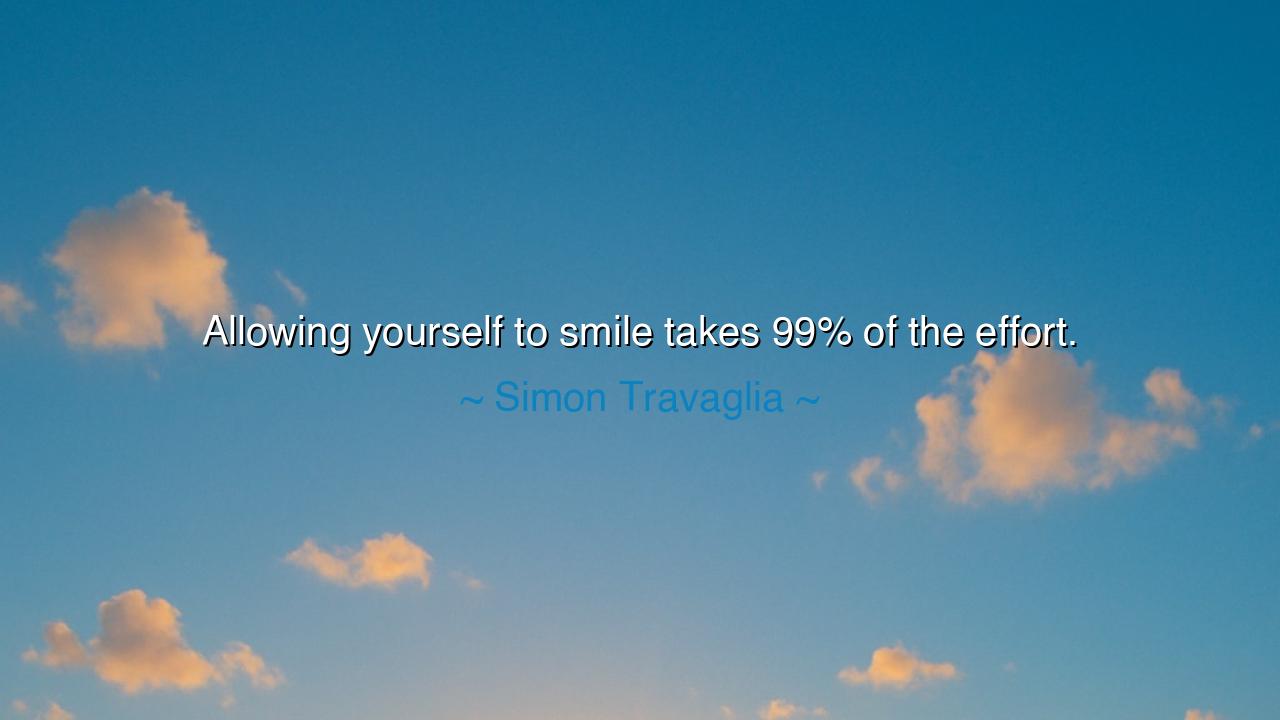
Allowing yourself to smile takes 99% of the effort.






Simon Travaglia, in his brief yet piercing words, has given a truth as enduring as stone: “Allowing yourself to smile takes 99% of the effort.” To the unwise, this may seem light, a jest of little weight. Yet to those who have wrestled with sorrow, who have borne the burden of life’s weary march, these words are a revelation. For the first battle of the soul is not fought in deeds, nor in great conquests, but in the small act of permitting joy to break through despair. A smile is no mere movement of lips—it is the outward sign that the heart has chosen hope over defeat.
Behold how difficult this choice can be. For when the world is heavy with grief, when loss or toil has chained the spirit, it is far easier to bow the head than to lift it. The true effort lies not in shaping the lips into a curve, but in granting the self permission to rise, even for a breath, above the storm. Thus does Travaglia remind us that the act of allowing is the burden; once it is lifted, the smile comes of its own accord, flowing like sunlight into a darkened room.
Think of Abraham Lincoln, whose face, etched with sorrow and battle-weariness, was known to the people as the visage of their trials. His nation torn asunder, his heart pierced by personal grief, he carried burdens heavier than most men could bear. Yet even so, he was famed for his sudden, tender smiles—moments where the iron weight seemed to lift, and he remembered the deeper purpose of his struggle. Those smiles, small though they seemed, carried light to a whole nation. But the great labor was not the smile itself—it was his choice to allow it, to open his heart amidst anguish.
Here lies the mystery: the gates of joy are not locked by others, but by ourselves. We imagine the world must first change, our burdens must first fall, our wounds must first heal. Yet Travaglia proclaims that the greatest part of the effort is inward, in saying, “I will not forbid my soul to rejoice.” Once the heart concedes this, the smallest breeze of goodness becomes enough to awaken a smile.
O seeker, understand that to withhold a smile is to deny yourself strength. For a smile is not weakness, but armor. It steels the spirit, it heartens companions, it disarms enmity. The ancients carved this wisdom in their stories: warriors who laughed on the eve of battle, saints who smiled though the pyre awaited them, mothers who smiled at their children though hunger gnawed at them. These were not idle gestures—they were victories over despair.
Therefore, let your practice be this: each day, in the midst of labor, pause and allow a smile. Not because the world is perfect, but because your soul must not be crushed by imperfection. Seek the small sparks of joy—a kind word, the shape of a tree against the sky, the warmth of breath in cold air—and let them kindle your smile. Know that the labor is not in the lips, but in the heart’s permission.
The lesson is clear: to smile is to declare that despair shall not be master. It is to say, “I will not close the door to joy, even in hardship.” Let this be your inheritance from Simon Travaglia’s words: that the battle of the heart is won not by force, but by yielding—by allowing the light to shine through. And when that light emerges, it will not only warm your path, but the paths of all who walk beside you.
Thus, take courage, for the effort is great but the reward greater. Permit yourself to smile, and in that small yet mighty act, you shall find the strength to endure, to inspire, and to live as one who carries light in a world too often shadowed.






AAdministratorAdministrator
Welcome, honored guests. Please leave a comment, we will respond soon